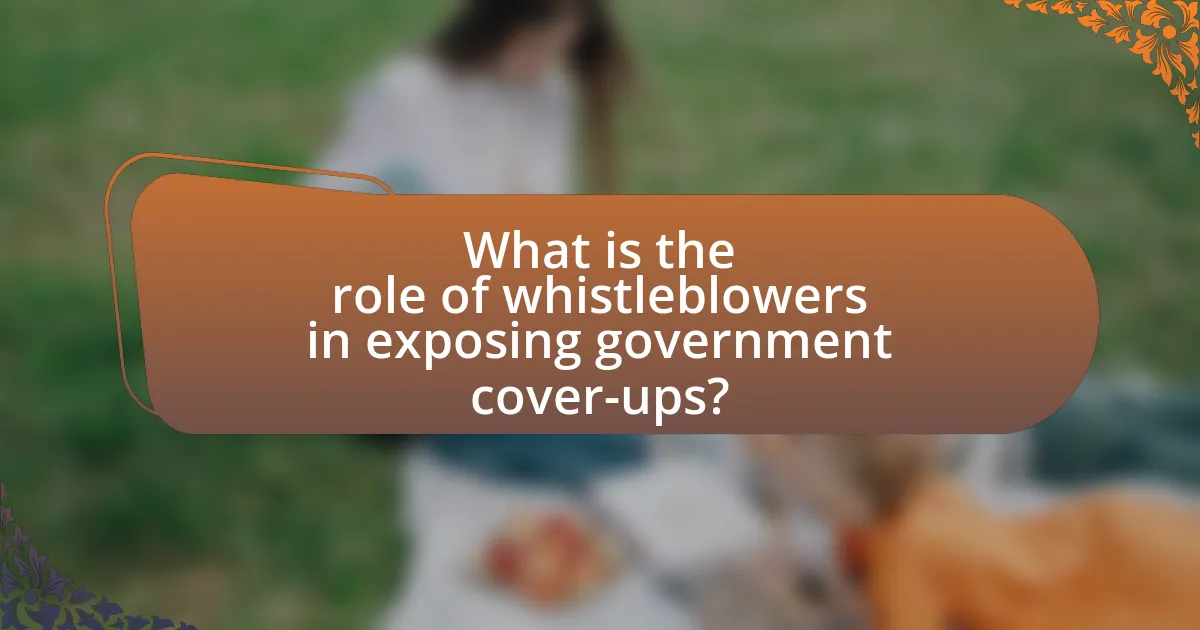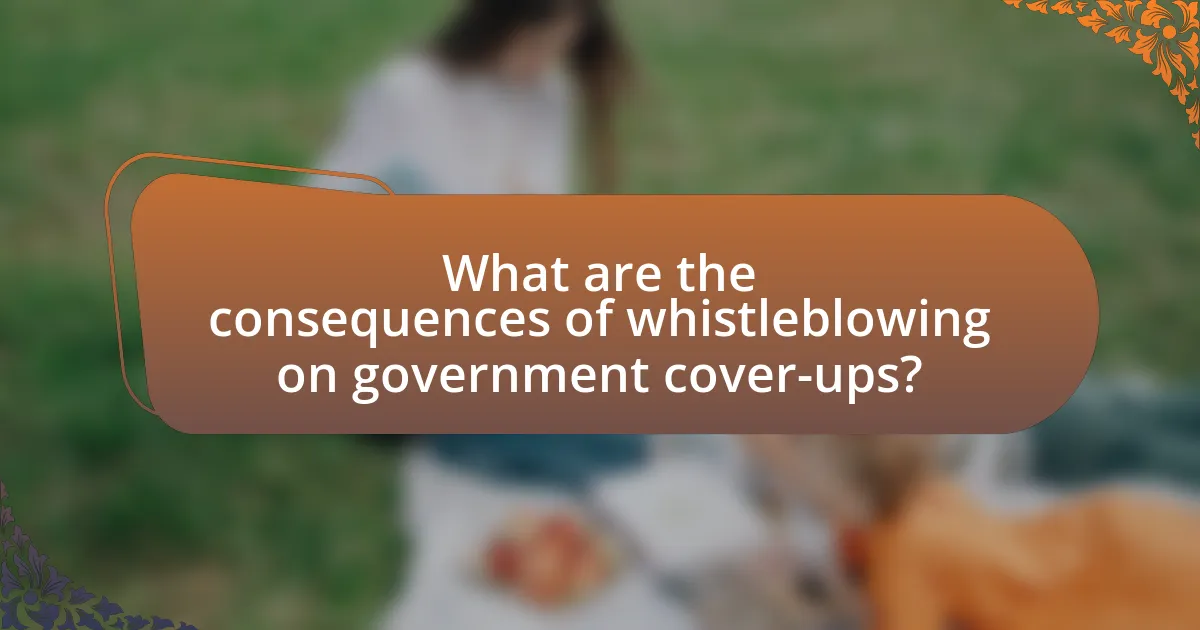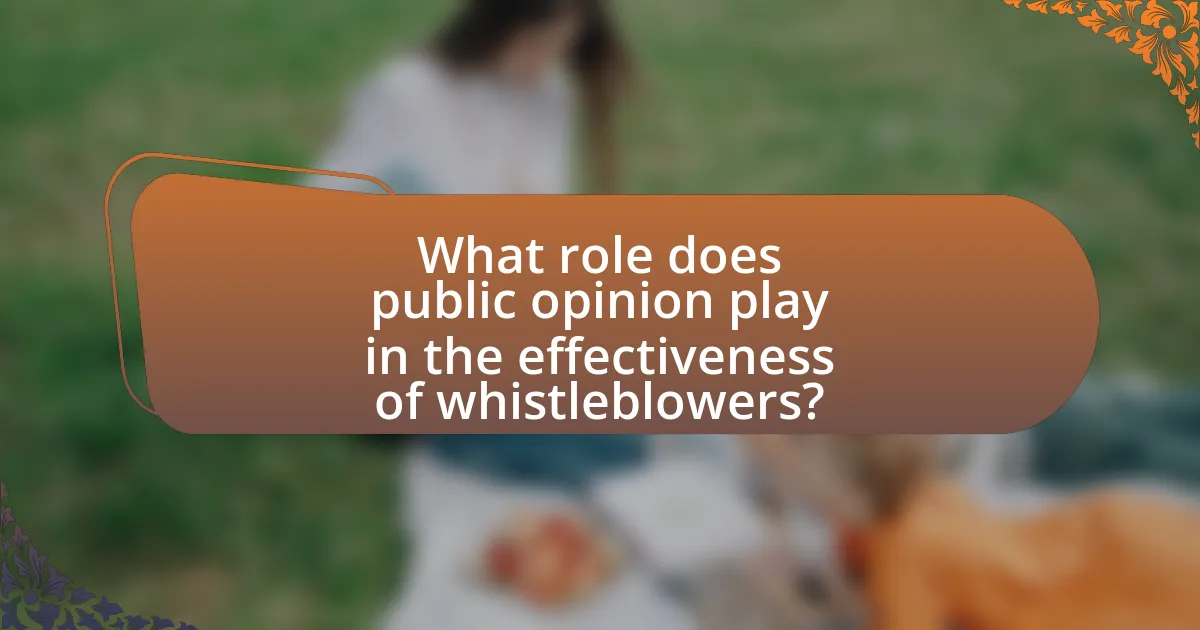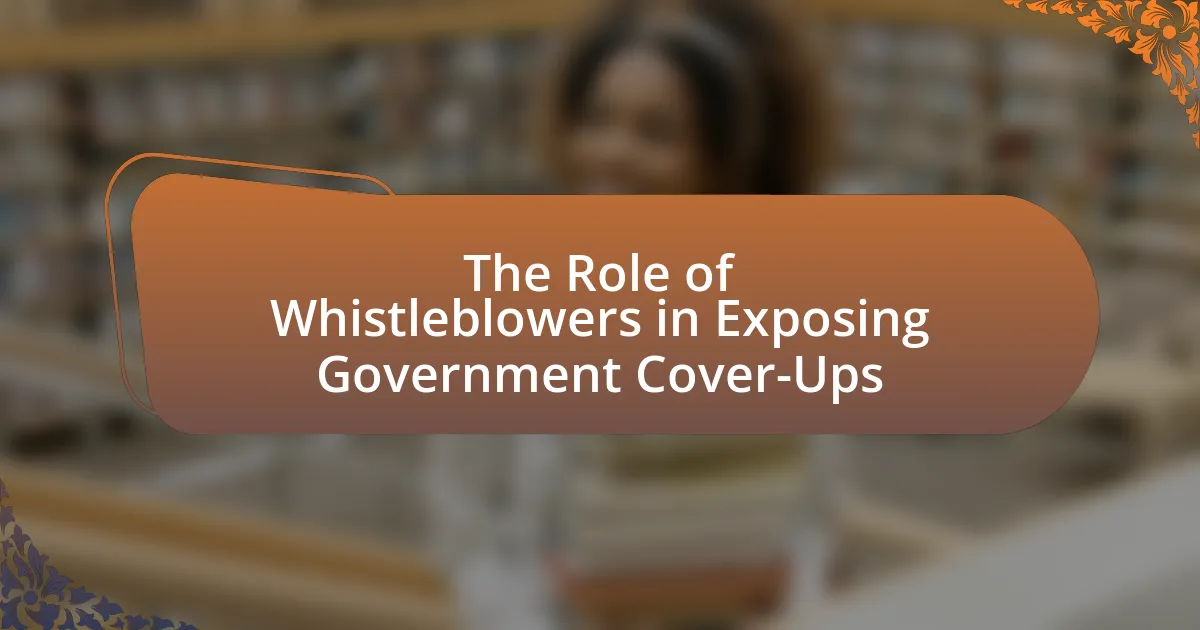Whistleblowers are individuals who expose government cover-ups by revealing hidden misconduct, corruption, or illegal activities within government agencies. Their disclosures can lead to significant investigations, accountability, and reforms, as demonstrated by notable cases such as Edward Snowden’s revelations about NSA surveillance. The article explores how whistleblowers identify cover-ups, gather evidence, and the legal protections available to them, while also addressing the psychological effects and challenges they face. Additionally, it examines the impact of public opinion and media coverage on whistleblower actions, highlighting the importance of societal support in fostering transparency and accountability in government.

What is the role of whistleblowers in exposing government cover-ups?
Whistleblowers play a crucial role in exposing government cover-ups by revealing information that is often hidden from the public. They provide insider knowledge about misconduct, corruption, or illegal activities within government agencies, which can lead to investigations and accountability. For instance, Edward Snowden’s disclosure of the National Security Agency’s surveillance programs in 2013 highlighted significant privacy violations and prompted widespread debate about government transparency and civil liberties. Such actions by whistleblowers can catalyze reforms and promote a culture of accountability within governmental institutions.
How do whistleblowers identify government cover-ups?
Whistleblowers identify government cover-ups by observing discrepancies between official statements and actual events or data. They often gather evidence through access to confidential documents, internal communications, or firsthand experiences that contradict public narratives. For instance, whistleblowers in the military have exposed instances where reports of civilian casualties were downplayed or omitted, revealing a pattern of misinformation. Additionally, whistleblowers may notice irregularities in procedures or policies that suggest intentional obfuscation, such as the suppression of scientific research or the alteration of data to mislead the public. These actions are often motivated by a commitment to transparency and accountability, as seen in cases like the Pentagon Papers, where whistleblowers revealed the true nature of U.S. involvement in Vietnam.
What signs indicate a potential government cover-up?
Signs indicating a potential government cover-up include lack of transparency, sudden changes in official narratives, and suppression of information. For instance, when government agencies withhold documents or restrict access to information, it often suggests an attempt to conceal facts. Historical examples, such as the Watergate scandal, demonstrate how initial denials and subsequent revelations of misconduct can signal deeper issues. Additionally, whistleblower testimonies frequently reveal discrepancies between public statements and internal communications, further supporting the notion of a cover-up.
How do whistleblowers gather evidence of wrongdoing?
Whistleblowers gather evidence of wrongdoing by documenting incidents, collecting relevant documents, and recording communications that demonstrate illegal or unethical activities. They often take detailed notes of events, gather emails, memos, and other official records that substantiate their claims. For instance, in the case of the Pentagon Papers, Daniel Ellsberg collected classified documents that revealed the U.S. government’s misleading information about the Vietnam War, which served as concrete evidence of wrongdoing. This methodical approach to evidence collection is crucial for whistleblowers to support their allegations and protect themselves legally.
Why are whistleblowers crucial in the fight against government corruption?
Whistleblowers are crucial in the fight against government corruption because they provide essential information that exposes unethical practices and illegal activities within governmental institutions. By reporting misconduct, whistleblowers help to uncover fraud, waste, and abuse of power, which can lead to investigations and reforms. For instance, the revelations by whistleblower Edward Snowden about the National Security Agency’s surveillance programs prompted widespread debate and legislative changes regarding privacy and government oversight. Such actions demonstrate how whistleblowers can catalyze accountability and transparency, ultimately contributing to the integrity of democratic governance.
What impact do whistleblowers have on public awareness?
Whistleblowers significantly enhance public awareness by exposing unethical practices and corruption within organizations, particularly in government. Their disclosures often lead to increased scrutiny and accountability, prompting public discourse and media coverage that informs citizens about issues that may otherwise remain hidden. For instance, the revelations by whistleblower Edward Snowden regarding the NSA’s surveillance programs sparked global debates about privacy rights and government overreach, illustrating how whistleblowers can catalyze widespread public engagement and awareness on critical issues.
How do whistleblowers influence policy changes?
Whistleblowers influence policy changes by exposing misconduct and unethical practices within organizations, prompting investigations and reforms. Their disclosures often lead to public awareness and pressure on policymakers to address the issues raised. For instance, the whistleblower Edward Snowden’s revelations about NSA surveillance practices resulted in significant debates and legislative changes regarding privacy and surveillance laws in the United States. Additionally, the 2002 Sarbanes-Oxley Act was enacted in response to corporate scandals, largely driven by whistleblower testimonies that highlighted the need for greater accountability and transparency in financial reporting. These examples illustrate how whistleblowers can catalyze legislative and regulatory reforms by bringing critical issues to light.
What legal protections exist for whistleblowers?
Legal protections for whistleblowers include statutes that safeguard individuals who report misconduct from retaliation. In the United States, the Whistleblower Protection Act of 1989 provides federal employees with the right to disclose information about illegal or unethical activities without fear of adverse employment actions. Additionally, various state laws offer similar protections, and specific sectors, such as healthcare and finance, have their own regulations that further protect whistleblowers. For instance, the Sarbanes-Oxley Act protects employees of publicly traded companies who report fraudulent activities. These legal frameworks are designed to encourage reporting by ensuring that whistleblowers can do so safely and without jeopardizing their careers.
What laws safeguard whistleblowers from retaliation?
The laws that safeguard whistleblowers from retaliation include the Whistleblower Protection Act (WPA) of 1989, which protects federal employees who disclose government misconduct. Additionally, various state laws provide similar protections, and the Sarbanes-Oxley Act protects employees of publicly traded companies who report fraudulent activities. The Dodd-Frank Wall Street Reform and Consumer Protection Act further incentivizes whistleblowing by offering monetary rewards for information leading to successful enforcement actions. These laws collectively aim to encourage reporting of wrongdoing without fear of adverse consequences.
How effective are these legal protections in practice?
Legal protections for whistleblowers are effective in practice, as they provide essential safeguards against retaliation and encourage reporting of misconduct. Studies indicate that jurisdictions with strong whistleblower laws, such as the United States’ Whistleblower Protection Act, have seen increased reporting of government malfeasance, with a reported 30% rise in whistleblower disclosures following the enactment of such protections. Furthermore, a survey by the Government Accountability Project found that 70% of whistleblowers felt more secure in reporting wrongdoing due to existing legal frameworks. These statistics demonstrate that legal protections significantly enhance the willingness of individuals to expose government cover-ups.
How do whistleblowers navigate the challenges they face?
Whistleblowers navigate the challenges they face by utilizing legal protections, seeking support from advocacy groups, and maintaining anonymity when possible. Legal protections, such as the Whistleblower Protection Act in the United States, provide safeguards against retaliation, allowing whistleblowers to report misconduct without fear of losing their jobs. Advocacy groups, like the Government Accountability Project, offer resources and guidance, helping whistleblowers understand their rights and navigate the reporting process. Additionally, many whistleblowers choose to remain anonymous or use secure communication methods to protect their identities, which can mitigate personal and professional risks associated with their disclosures. These strategies collectively empower whistleblowers to confront the significant obstacles they encounter while exposing government cover-ups.
What are the psychological effects of being a whistleblower?
Being a whistleblower can lead to significant psychological effects, including anxiety, depression, and post-traumatic stress disorder (PTSD). Research indicates that whistleblowers often experience feelings of isolation and betrayal, particularly when they face retaliation from their organizations. A study published in the Journal of Business Ethics found that 60% of whistleblowers reported experiencing negative psychological impacts, such as stress and emotional distress, after their disclosures. Additionally, the fear of job loss and social ostracism can exacerbate these psychological challenges, leading to long-term mental health issues.
How can whistleblowers cope with stress and isolation?
Whistleblowers can cope with stress and isolation by seeking support from trusted friends, family, or professional counselors. Engaging in support groups specifically for whistleblowers can provide a sense of community and understanding, as these groups often share similar experiences and challenges. Additionally, practicing stress-reduction techniques such as mindfulness, exercise, and hobbies can help mitigate feelings of anxiety and loneliness. Research indicates that social support significantly reduces stress levels, highlighting the importance of connection during challenging times.
What support systems are available for whistleblowers?
Support systems available for whistleblowers include legal protections, financial assistance, and counseling services. Legal protections, such as the Whistleblower Protection Act in the United States, safeguard whistleblowers from retaliation by employers, ensuring they can report misconduct without fear of job loss or harassment. Financial assistance programs, like those offered by the Securities and Exchange Commission, provide monetary rewards for whistleblowers who report securities law violations, incentivizing the reporting of wrongdoing. Additionally, counseling services help whistleblowers cope with the emotional and psychological stress associated with their disclosures, providing necessary support during challenging times. These systems collectively aim to encourage the reporting of unethical practices while protecting the individuals who come forward.

What are the consequences of whistleblowing on government cover-ups?
Whistleblowing on government cover-ups can lead to significant consequences, including legal repercussions for the whistleblower, potential retaliation from the government, and public exposure of misconduct. Whistleblowers often face job loss, harassment, or legal action as a result of their disclosures, as seen in cases like Edward Snowden, who faced charges under the Espionage Act after revealing NSA surveillance practices. Additionally, government entities may attempt to discredit the whistleblower to protect their interests, which can further complicate the whistleblower’s situation. Despite these risks, whistleblowing can also result in positive outcomes, such as increased public awareness and accountability, as demonstrated by the exposure of the Watergate scandal, which led to significant political reforms.
How can whistleblowing lead to accountability in government?
Whistleblowing can lead to accountability in government by exposing misconduct, corruption, or illegal activities that may otherwise remain hidden. When individuals within government agencies report unethical behavior, they provide critical information that can prompt investigations and reforms. For instance, the whistleblower Edward Snowden revealed extensive surveillance practices by the National Security Agency, which led to public debate and legislative changes regarding privacy and government oversight. Such disclosures can result in legal consequences for wrongdoers and foster a culture of transparency, ultimately holding government officials accountable for their actions.
What are some notable cases where whistleblowers succeeded?
Notable cases where whistleblowers succeeded include the exposure of the Watergate scandal by Mark Felt, who revealed the involvement of high-ranking officials in the break-in and subsequent cover-up, leading to President Nixon’s resignation in 1974. Another significant case is that of Jeffrey Wigand, a former tobacco executive who disclosed the industry’s knowledge of the dangers of smoking, resulting in major lawsuits and regulatory changes in the tobacco industry. Additionally, Edward Snowden’s revelations about the NSA’s mass surveillance programs in 2013 prompted global debates on privacy and government overreach, leading to reforms in surveillance practices. These cases illustrate the impactful role of whistleblowers in bringing critical issues to light and prompting significant changes.
What challenges do whistleblowers face in achieving accountability?
Whistleblowers face significant challenges in achieving accountability, primarily due to retaliation, lack of legal protections, and institutional resistance. Retaliation can manifest as job loss, harassment, or legal action against the whistleblower, which discourages individuals from coming forward. According to a report by the Government Accountability Project, nearly 90% of whistleblowers experience some form of retaliation. Additionally, existing legal protections, such as the Whistleblower Protection Act in the United States, are often inadequate, leaving whistleblowers vulnerable to employer reprisals. Institutional resistance further complicates accountability, as organizations may prioritize self-preservation over transparency, leading to cover-ups and a culture of silence. These factors collectively hinder the effectiveness of whistleblowers in promoting accountability within government and corporate structures.
What risks do whistleblowers take when exposing government cover-ups?
Whistleblowers face significant risks when exposing government cover-ups, including legal repercussions, professional retaliation, and personal safety threats. Legal repercussions can involve criminal charges or civil lawsuits, as whistleblowers may violate confidentiality agreements or laws protecting classified information. Professional retaliation often manifests as job loss, demotion, or blacklisting, as organizations may seek to silence dissenting voices. Personal safety threats can include harassment, intimidation, or even physical harm, as seen in cases like that of Edward Snowden, who faced severe consequences for revealing NSA surveillance practices. These risks highlight the precarious position of whistleblowers in their pursuit of transparency and accountability.
What personal and professional repercussions can they face?
Whistleblowers can face significant personal and professional repercussions, including job loss, social ostracism, and legal challenges. When individuals expose government cover-ups, they often encounter retaliation from employers, which can manifest as termination or demotion, as seen in cases like that of Edward Snowden, who faced exile and criminal charges after revealing NSA surveillance practices. Additionally, whistleblowers may experience emotional distress, including anxiety and depression, due to the isolation and stigma associated with their actions. These repercussions highlight the risks involved in whistleblowing, despite its critical role in promoting transparency and accountability in government.
How do these risks affect their decision to blow the whistle?
The risks associated with blowing the whistle significantly influence an individual’s decision to report misconduct. Fear of retaliation, including job loss, legal consequences, and social ostracism, often deters potential whistleblowers from coming forward. For instance, a study by the Government Accountability Project found that 90% of whistleblowers experience some form of retaliation, which underscores the substantial impact these risks have on their willingness to act. Additionally, the potential for personal and professional repercussions creates a climate of fear that can inhibit the disclosure of critical information regarding government cover-ups.
How can society support whistleblowers in their efforts?
Society can support whistleblowers by implementing robust legal protections and providing financial assistance. Legal frameworks, such as the Whistleblower Protection Act in the United States, safeguard individuals from retaliation, ensuring they can report misconduct without fear of losing their jobs or facing legal repercussions. Additionally, organizations can establish anonymous reporting channels and offer counseling services to help whistleblowers navigate the emotional and psychological challenges they may encounter. Research indicates that countries with strong whistleblower protections, like Denmark and Sweden, experience higher rates of reporting, demonstrating the effectiveness of supportive measures.

What role does public opinion play in the effectiveness of whistleblowers?
Public opinion significantly influences the effectiveness of whistleblowers by shaping the environment in which their disclosures are received. When public sentiment is supportive of whistleblowers, it can lead to increased protection for them and greater accountability for the entities they expose. For instance, high-profile cases like Edward Snowden’s revelations about NSA surveillance garnered substantial public support, which helped sustain discussions about privacy rights and government transparency. Conversely, negative public opinion can result in retaliation against whistleblowers and diminish the impact of their disclosures, as seen in cases where whistleblowers faced public vilification. Thus, the alignment of public opinion with whistleblower actions can either empower or hinder their effectiveness in exposing government cover-ups.
How does media coverage impact whistleblower cases?
Media coverage significantly impacts whistleblower cases by amplifying the visibility of the allegations and influencing public perception. When the media reports on whistleblower disclosures, it can lead to increased scrutiny of the implicated organizations, prompting investigations and accountability measures. For instance, the exposure of Edward Snowden’s revelations about NSA surveillance practices in 2013 led to widespread public debate and legislative changes regarding privacy and government oversight. Additionally, media coverage can provide whistleblowers with a platform for protection, as public support can deter retaliation from employers. Studies have shown that whistleblowers who receive media attention are more likely to have their claims taken seriously and to experience positive outcomes in their cases.
What role does social media play in amplifying whistleblower voices?
Social media plays a crucial role in amplifying whistleblower voices by providing a platform for immediate dissemination of information and fostering public engagement. This digital landscape allows whistleblowers to share their experiences and evidence directly with a global audience, bypassing traditional media gatekeepers. For instance, the 2013 revelations by Edward Snowden regarding NSA surveillance were significantly amplified through platforms like Twitter and Facebook, which facilitated widespread public discourse and mobilization. Additionally, studies indicate that social media can enhance the visibility of whistleblower claims, leading to increased public support and pressure on authorities to address the issues raised.
How can public support influence the outcomes of whistleblower actions?
Public support can significantly influence the outcomes of whistleblower actions by providing a protective environment and amplifying the whistleblower’s message. When the public rallies behind a whistleblower, it can lead to increased media attention, which often pressures organizations or governments to take action. For instance, the case of Edward Snowden, whose disclosures about NSA surveillance practices garnered widespread public support, resulted in ongoing debates about privacy and government transparency, ultimately leading to legislative changes like the USA Freedom Act. This demonstrates that public backing not only validates the whistleblower’s claims but also creates a collective demand for accountability, thereby enhancing the likelihood of positive outcomes for the whistleblower and the issues they expose.
What best practices can whistleblowers follow to protect themselves?
Whistleblowers can protect themselves by documenting all relevant information and communications related to their disclosures. This practice ensures that they have a clear record of events, which can be crucial in case of retaliation or legal challenges. Additionally, whistleblowers should seek legal counsel to understand their rights and protections under laws such as the Whistleblower Protection Act, which provides safeguards against retaliation for reporting misconduct. Engaging with trusted organizations that specialize in whistleblower support can also provide guidance and resources. Furthermore, maintaining confidentiality by using secure communication methods can help protect their identity and reduce the risk of exposure. These practices are supported by various studies indicating that thorough documentation and legal awareness significantly enhance the safety and effectiveness of whistleblowers.
How should whistleblowers document their findings?
Whistleblowers should document their findings by maintaining detailed records of incidents, including dates, times, locations, and the individuals involved. This thorough documentation serves as credible evidence to support their claims and can be crucial in investigations. Additionally, whistleblowers should gather any relevant documents, emails, or other materials that corroborate their observations. According to the Government Accountability Project, effective documentation increases the likelihood of a successful outcome in whistleblower cases, as it provides a clear and factual basis for allegations.
What steps can whistleblowers take to ensure their safety?
Whistleblowers can ensure their safety by taking several proactive steps. First, they should document all evidence related to the wrongdoing meticulously, as this provides a clear record that can support their claims. Second, they should seek legal counsel to understand their rights and protections under whistleblower laws, such as the Whistleblower Protection Act in the United States, which safeguards them from retaliation. Third, whistleblowers can report their concerns to appropriate authorities or independent watchdog organizations that specialize in handling such cases, ensuring that their identity is protected. Additionally, using anonymous reporting channels can further enhance their safety by concealing their identity. Finally, whistleblowers should consider engaging with advocacy groups that provide support and resources for individuals in their situation, which can offer both emotional and practical assistance. These steps collectively help mitigate risks associated with whistleblowing.
